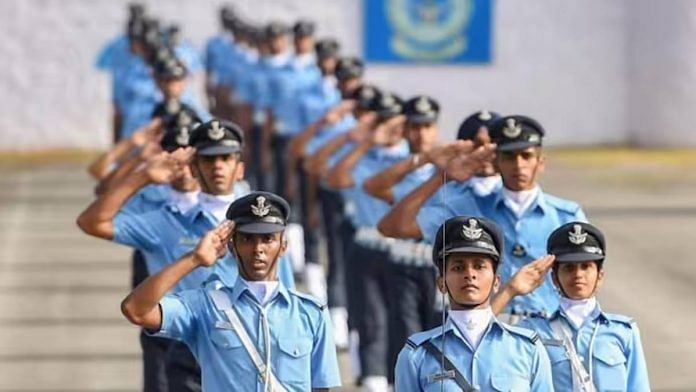New Delhi: The Armed Forces Tribunal (AFT) has directed the Union Ministry of Defence to “examine the necessity of having a suitable policy” for women who once served the forces as Short Service Commission (SSC) officers, but seek a re-entry after the death of their spouses, who perished while serving in the armed forces.
Delivered on 18 May, the verdict requires the central government to review its November 2017 policy on “Veer Naris” that gives compassionate appointments to widows of armed forces personnel who die in harness. The policy envisages hiring widows under the SSC scheme.
The current policy does not specifically mention anything about the class of widows who had earlier served in the armed forces, took release due to compelling domestic issues, and now want to join back after their husbands, also officers in the forces, died in harness.
The AFT’s principal bench of Justice Anjana Mishra (judicial member) and Lt-Gen (retd) P.M. Hariz (administrative member) asked the government to examine the policy within three months and file a compliance report before it, giving details of the decisions arrived at.
The AFT is a quasi-judicial body that exclusively hears disputes related to the armed forces. Its 18 May judgment came on a petition filed by former squadron leader Priyanka Saxena, who had applied in the Indian Air Force (IAF) for reinstatement, but was never considered.
Also Read: The wife, the family and the Army – the politics of ‘Veer Nari’ and compensation
Arguments from both sides
Priyanka Saxena had submitted her application to the AFT in early 2022, months after her husband — a fighter pilot — died while flying a MIG-21 in December 2021. She had two daughters, aged nine and five, to look after.
Saxena had already served for 10 years in the IAF as an SSC officer. Yet, her application for re-joining the force was never processed.
She had joined the force in December 2003 and got released in December 2013, when she did not opt for permanent commission due to domestic compulsions. However, after her husband’s demise, Saxena applied for reinstatement into the IAF.
She claimed she was entitled to compassionate appointment under the Veer Nari scheme envisaged in a policy issued in 2017. Saxena, however, wanted the AFT to relax the age criterion laid down in the policy, which caps the maximum age for a candidate applying under the scheme to 35 years.
Saxena, who was over the age of 35 when she applied for the scheme, argued that candidates like her should be granted additional relaxation in the age criteria owing to their earlier service in the armed forces.
Saxena’s lawyer, Sudhanshu Pandey, drew the tribunal’s attention to various concessions available to former servicemen seeking employment in civilian posts, which include relaxation of five years in the upper age limit.
He argued for a similar concession for women officers who had served the armed forces and were seeking re-entry due to the sudden demise of their spouses, who too were employed with the services.
Opposing Saxena’s plea, the government said that since she had not opted for a permanent commission or extension in the forces, unlike her other batchmates, her rights as an employee ceased to exist and she no longer had any fundamental right to seek reinstatement based on her old service record.
The government further said that any appointment or position on compassionate grounds can only be made within the framework of the prevailing policy. Similar requests made by four other IAF women officers, who had been widowed, were rejected.
However, the tribunal was told that the government had provided assistance for seeking alternative employment through the placement cell of the IAF. Saxena, the government stated, was given the option to consider entry into the Territorial Army unit, which was not taken by her.
On a perusal of the policy on Veer Naris and considering the arguments advanced by both sides, the tribunal came to the conclusion that the provisions of the scheme were applicable to widows in general who wished to seek entry into pre-commission training, and that it did not specifically mention anything about the class of women officers who had earlier served in the armed forces.
The AFT observed that women who have been in the services are a trained pool of officers and can still contribute if given an opportunity to re-enter the services.
“We are cognisant of the fact that extension or permanent commission is granted as per the requirements of service, availability of vacancies, laid-down eligibility, suitability, willingness and merit of each officer. Therefore, there arises a moot question, whether the services need to have an appropriate policy to facilitate the return of women officers, who are unfortunately widowed, placed in a compelling situation and seek re-entry into the services, when in the first place they may not have been found fit for extension/grant of permanent commission,” the tribunal observed.
(Edited by Nida Fatima Siddiqui)
Also Read: Can’t silence cases. As more women join, Indian military must address sexual assault problem



